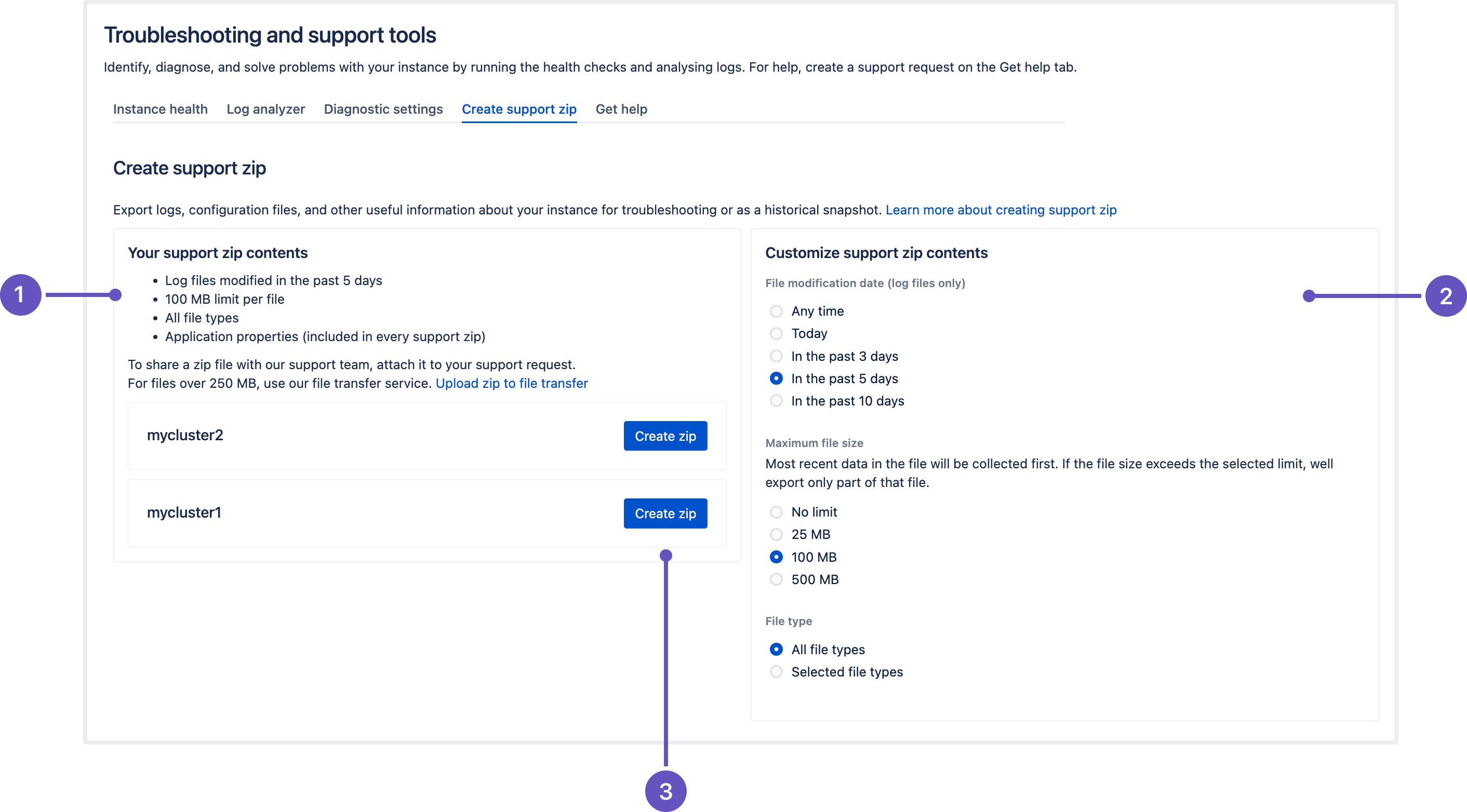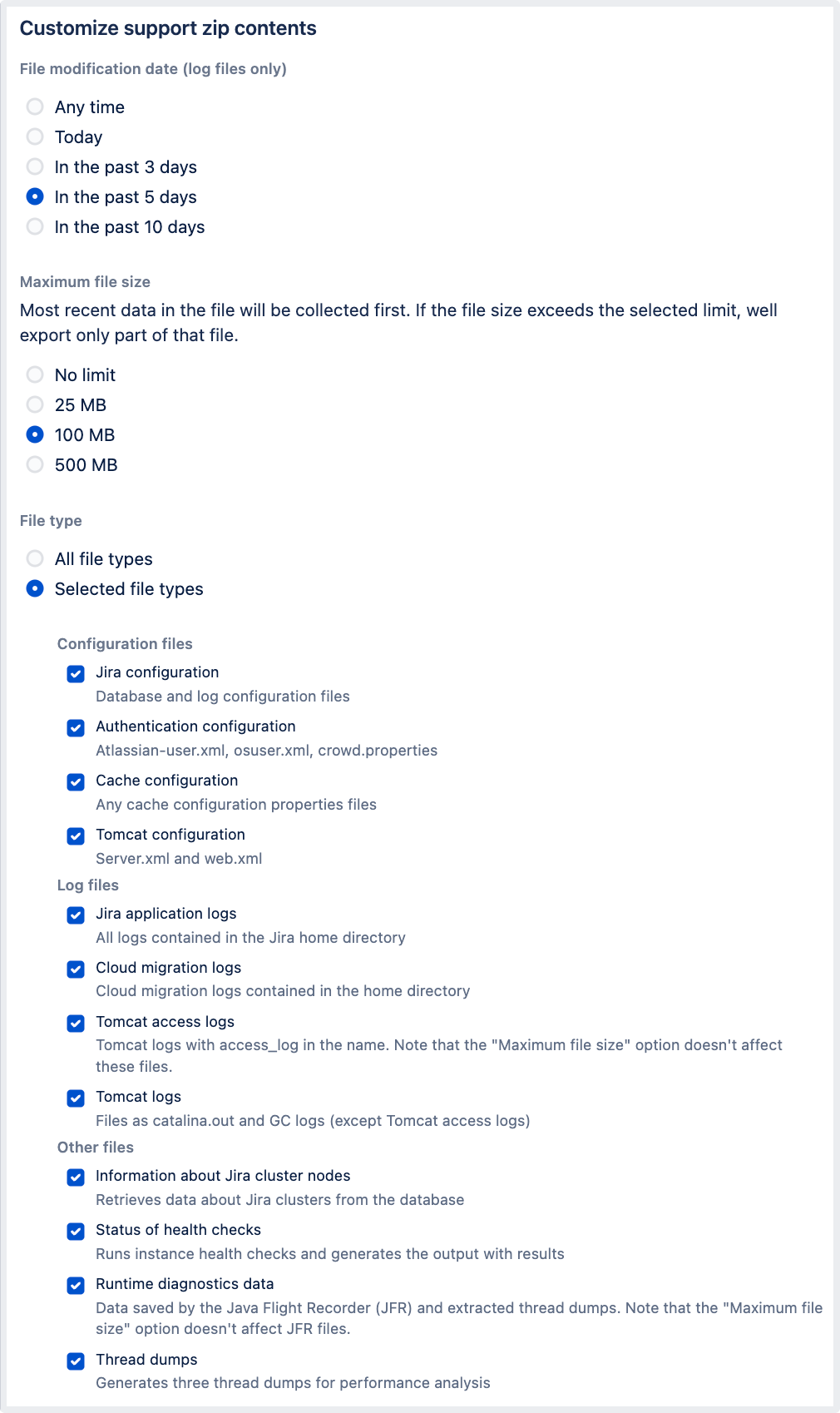Create a Support Zip
Platform notice: Server and Data Center only. This article only applies to Atlassian products on the Server and Data Center platforms.
Support for Server* products ended on February 15th 2024. If you are running a Server product, you can visit the Atlassian Server end of support announcement to review your migration options.
*Except Fisheye and Crucible
If you're having issues with your Atlassian product, it can be useful to create a support zip—the .zip file that contains logs from your instance as well as diagnostic and configuration information.
You can send this file to our support team to help them understand how your application is configured and troubleshoot your problem efficiently. Sharing a support zip is optional, but it does provide valuable information for Atlassian support and usually reduces the troubleshooting time.
You can create a support zip by using the Atlassian Troubleshooting and Support Tools (ATST) app. Learn more about Atlassian Troubleshooting and Support Tools
The Troubleshooting and Support Tools app is installed and enabled in your Atlassian product by default.
The information on this page is for the latest version of the app. Your version may look slightly different, but the basic functionality is the same.
Creating a support zip
The Troubleshooting and Support Tools app simplifies the process of securely gathering your log and configuration files. It clears any usernames and passwords it finds in your configuration files but doesn’t remove usernames and other potentially sensitive content present in the log files.
To create a support zip:
Open Troubleshooting and Support Tools in your Atlassian product. Learn how to access Troubleshooting and Support Tools
- Go to the Create support zip tab and customize the contents of your support zip. Learn more about customizing support zip contents
Download the zip. If your instance is clustered, all available cluster nodes will be listed. You can create a zip on a single node or download zips for multiple nodes.
Verify the contents of your zip file.
Customize the contents of your zip file.
Create a new support zip on this node.
If you've changed the location of your log files, they won’t be included in a support zip. You'll need to attach your logs to your support request manually.
Customizing the contents of the zip
By default, a support zip contains:
all file types except thread dumps and tomcat access logs
100 MB limit per file
log files modified in the past five days
You can also customize the contents of each support zip:
File modification date (log files only): include log files that were last modified within the selected period.
The File modification date is defined in Coordinated Universal Time (UTC), Jira’s default time zone. If you’re in a different timezone, this will affect the number of exported logs.
For example, if you want to export logs modified Today and it’s currently 1 AM UTC, you’ll only get logs that have been modified within the past hour.
File modification date options include:
Any time — any available log files will be included in a zip.
Today — log files edited during the current day, since 00:00 UTC (0-1 day's worth of data).
In the past 3 days — log files edited 3 days before today, since 00:00 UTC (3-4 days' worth of data).
In the past 5 days — log files edited 5 days before today, since 00:00 UTC (5-6 days' worth of data).
In the past 10 days — log files edited 10 days before today, since 00:00 UTC (10-11 days' worth of data).
- Maximum file size: limit the size of each exported file. If you set a size limit, any files bigger than the limit will be partially exported (truncated). Jira will begin collecting data from each file, starting from the most recent entry and up until the limit is reached.
File size options include:
No limit - all selected files will be fully exported.
25 MB limit per file.
100 MB per file.
500 MB limit per file.
The file size limitation won’t be applied to Runtime diagnostics data (Java Flight Recorder files) and Tomcat logs. These files are always fully exported.
Since X.X version of the app, we no longer limit Tomcat access logs to the five most recent files. As these files are created once a day, you might want to reduce the number of exported logs by using the new File modification date option.
- File type: add all files to the support zip or select particular files that you want to export.
Example of the customization options in Jira:
After you create a zip, your customization preferences will be autosaved and shared across the instance. We’ll keep your previous selections even if you reload or close the page, keeping this information in the plugin storage.
Create a support zip using the REST API
The 1.49.0 version of the app introduces changes to the REST API. We’ve added new API parameters that allow you to configure the File modification date and Maximum file size options.
If you upgrade your ATST app to the 1.49.0 version or later but continue using the old API only with the fileConstraintLastModified parameter to fetch Tomcat access logs, all Tomcat access logs will be added to the zip. This might significantly affect your zip size because these logs aren’t affected by the Maximum file size option.
To limit the number of Tomcat access logs added to your zip, use the new fileConstraintAge parameter.
Learn more about the new API parameters introduced in 1.49.0
If you prefer to use the REST API to create a support zip, check out the following guides for instructions:
Create a support zip using the REST API in Data Center applications
Create a support zip using the REST API in Server applications
Files included in a support zip
Here's a summary of what is included in the support zip. The items will vary slightly from product to product.
| Item | Application | New Text |
|---|---|---|
Application properties
| All | Includes memory statistics, system settings, and other configurations. This information is included in every support zip. |
<Application> configuration
| All |
|
<Application> logs
| All | Includes all logs contained in the home directory. |
Helm chart configuration
| Bamboo | Includes an effective Helm values file. Available only if the application runs in a Kubernetes environment and the respective feature is turned on in Helm values. |
Tomcat configuration
| Bamboo | Includes Apache Tomcat configuration files, such as |
Tomcat logs
| Bamboo | Includes log files stored in the installation directory, such as catalina.out and GC logs. |
| Tomcat access logs | Bamboo | Includes HTTP Access logs from Tomcat's log folder. These are not included by default. In Bitbucket, access logs are included by default as part of the application logs. The Maximum file size option doesn’t affect Tomcat access logs. |
| Console out log | Fisheye | Includes fisheye.out log files. |
Authentication configuration
| Bamboo | Includes authentication configuration files such as atlassian-user.xml, osuser.xml, crowd.properties. |
Cache configuration
| Confluence | Includes any cache configuration properties files. |
Health checks
| Confluence | Includes results of previous health checks. |
Confluence customizations
| Confluence | Includes velocity templates, custom HTML, and custom CSS. |
Synchrony configuration
| Confluence | Includes synchrony-args.properties file. |
| Plugin configuration | Crucible | Includes plugin configuration files. |
| Modified files | Crucible | Includes all locally modified files. |
Plugin state properties
| Crucible | Includes pluginstate.properties file. |
Thread dumps
| All | Generates 3 thread dumps at 5 second intervals for performance analysis. Our support team may ask you to generate thread dumps externally if more information is required. |
| Include runtime diagnostics data | Bitbucket | Includes data saved by the Java Flight Recorder (JFR) and extracted thread dumps. Learn more about diagnosing runtime issues using the Java Flight Recorder The Maximum file size option doesn’t affect JFR files. |
Database queries
| Confluence | Available on ATST versions 2.4.0+ and 1.62.0+. Includes the results of some database queries covering plugins details, general configuration and more. |


